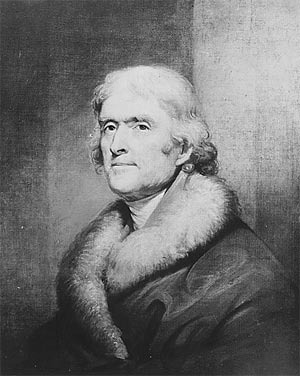 "If we are constrained to lift the hatchet against any tribe, we will never lay it down until that tribe is exterminated, or driven beyond the Mississippi."
"If we are constrained to lift the hatchet against any tribe, we will never lay it down until that tribe is exterminated, or driven beyond the Mississippi."
Thomas Jefferson to Secretary of War General Henry Dearborn, 1807.
Thomas Jefferson was born in Virginia in 1743. He was the principal author the Declaration of Independence in 1776 and served as President George Washington's secretary of state, and then as vice president under President John Adams. In 1791, he helped organize one of America's first political parties, the so-called Democratic-Republican Party. He became the third President of the United States in 1801, leaving office eight years later. As president he oversaw the 1803 purchase of Louisiana Territory from France, and in 1804 sent the Lewis and Clark expedition to explore the "new lands" with the idea that it would help U.S. expansion in the future.
As governor of Virginia during the Revolutionary War, Jefferson had recommended forcibly moving Cherokee and Shawnee tribes that fought on the British side to lands west of the Mississippi River. In 1803, as president, Jefferson proposed in private letters a policy that under Andrew Jackson, in 1830, would take shape as the Indian Removal Act. He also made a deal with elected officials of the state of Georgia that would help expel the Cherokee people from their land, violating an existing treaty between the Cherokee Nation and the U.S Government.
Jefferson believed in acculturation: that Native peoples should give up their cultures, religions, and lifeways and take on the ways of white men, including Christianity and European-style agriculture and government. Jefferson believed that without this, Indians "will relapse into barbarism & misery, lose numbers by war & want, and we shall be obliged to drive them with the beasts of the forest into the Stony mountains." (Letter to John Adams, 1812). He believed that assimilation of Native Americans into white economy would make them more dependent on trade, and that they would eventually be willing to give up land in exchange for goods or to resolve unpaid debts.
"To promote this disposition to exchange lands, which they have to spare and we want, for necessaries, which we have to spare and they want, we shall push our trading uses, and be glad to see the good and influential individuals among them run in debt, because we observe that when these debts get beyond what the individuals can pay, they become willing to lop them off by a cession of lands.... In this way our settlements will gradually circumscribe and approach the Indians, and they will in time either incorporate with us a citizens or the United States, or remove beyond the Mississippi."
Jefferson to William H. Harrison, 1803
Theme:
Topics:
Bibliography:
The Thomas Jefferson Papers, 1606-1827. Library of Congress, Manuscript Division.
Resources for Further Research:
Primary
The Thomas Jefferson Papers, 1606-1827. Library of Congress, Manuscript Division.




